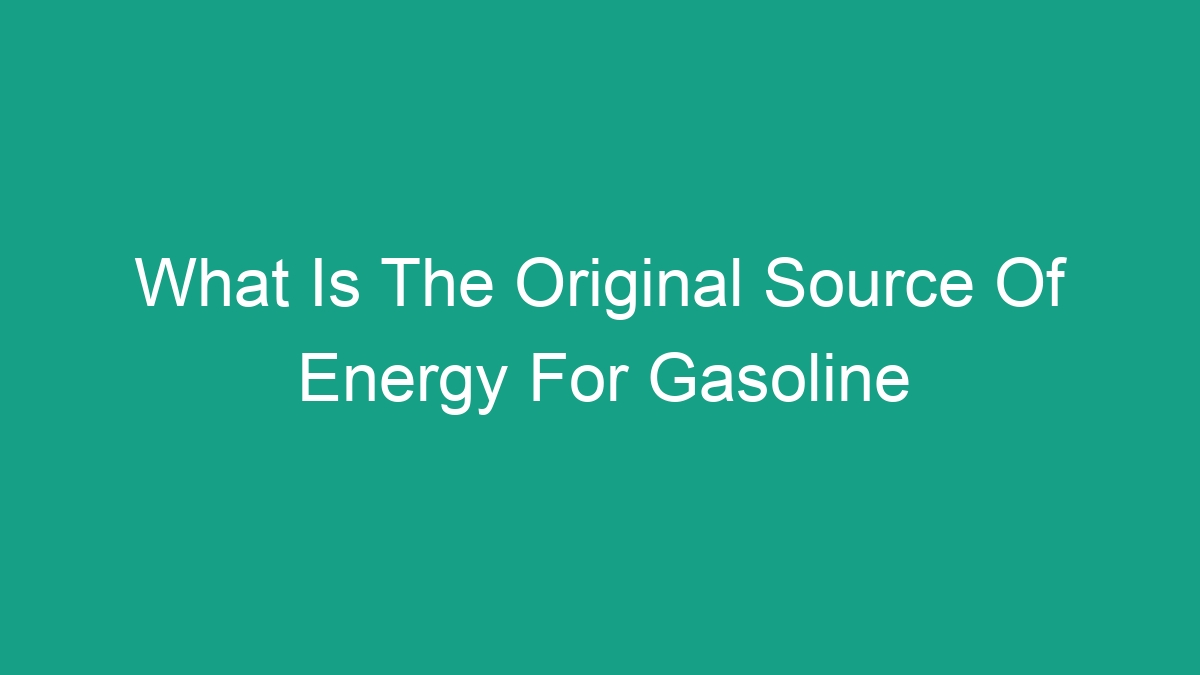
Gasoline is a widely used fuel in the automotive industry, but have you ever wondered what the original source of energy for gasoline is? In this article, we will explore the origins of gasoline, its production process, and its role as a source of energy for various applications.
The Origins of Gasoline
Gasoline is a derivative of crude oil, which is the primary source of energy for this fuel. Crude oil is a naturally occurring, unrefined petroleum product composed of hydrocarbon deposits. It is typically found deep underground and extracted through drilling operations. Once extracted, crude oil is transported to refineries for processing into various petroleum products, including gasoline.
Production Process
The production of gasoline from crude oil involves a series of complex refining processes. The primary process, known as distillation, separates the various components of crude oil based on their boiling points. During distillation, crude oil is heated to a high temperature, causing it to vaporize. The vapor then enters a distillation tower, where it is cooled and condensed into different fractions. One of these fractions is gasoline, which is collected and further processed to meet specific quality standards.
After distillation, the gasoline fraction undergoes additional refining steps, such as catalytic cracking and reforming, to improve its quality and increase its octane rating. These processes help remove impurities, enhance performance, and ensure that gasoline meets environmental regulations.
Role as a Source of Energy
Gasoline serves as a crucial source of energy for a wide range of applications, with an emphasis on the transportation sector. It is the primary fuel used in internal combustion engines, such as those found in cars, motorcycles, trucks, and other vehicles. When gasoline is burned in these engines, it releases energy in the form of heat, which is used to power the vehicle’s movement.
In addition to its use in transportation, gasoline is also utilized in various non-automotive applications, including power generators, lawn mowers, and small engine equipment. These applications rely on gasoline to deliver the energy needed to perform specific tasks efficiently.
Environmental Impact
The production and use of gasoline have significant environmental implications, mainly related to air pollution and greenhouse gas emissions. During the extraction and refining of crude oil, various environmental risks, such as oil spills and habitat destruction, can occur. Additionally, the combustion of gasoline in internal combustion engines releases pollutants, such as carbon monoxide, nitrogen oxides, and volatile organic compounds, into the atmosphere, contributing to air quality issues.
To address these environmental concerns, efforts have been made to develop cleaner-burning fuels and improve vehicle technologies to reduce emissions. These include the introduction of low-sulfur gasoline, the use of catalytic converters in vehicles, and the promotion of alternative fuel options, such as electric vehicles and hydrogen fuel cells.
Future Outlook
The future of gasoline as a source of energy is subject to ongoing developments in energy policies, technological advancements, and environmental considerations. As the world seeks to reduce its carbon footprint and transition towards more sustainable energy sources, the demand for gasoline may decline in favor of cleaner alternatives. However, gasoline is expected to remain a significant energy source for the foreseeable future, particularly in regions where alternative fuels and infrastructure are not yet widely available.
The continued research and development of fuel-efficient vehicles, renewable fuels, and emissions-reducing technologies will play a crucial role in shaping the future of gasoline as a source of energy.
FAQs
What are the major components of crude oil?
Crude oil is composed of hydrocarbons, which are organic compounds made up of hydrogen and carbon atoms. The main hydrocarbons found in crude oil include alkanes, cycloalkanes, aromatic hydrocarbons, and heterocyclic compounds.
How is gasoline different from diesel fuel?
Gasoline and diesel fuel are both derived from crude oil and used as transportation fuels, but they have distinct properties and applications. Gasoline is a lighter, more volatile fuel that is used in spark-ignition engines, while diesel fuel is heavier and less volatile, primarily used in compression-ignition engines.
What are some alternative fuels to gasoline?
Alternative fuels to gasoline include ethanol, biodiesel, compressed natural gas (CNG), liquefied petroleum gas (LPG), hydrogen fuel cells, and electric power. These fuels offer environmental benefits and are considered to be more sustainable than traditional gasoline.
As demonstrated, gasoline’s original source of energy is derived from crude oil, and its production process involves a series of complex refining steps. It serves as a crucial source of energy for transportation and various other applications, but its environmental impact and future outlook are subjects of ongoing debate and innovation.



